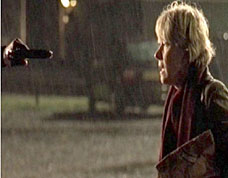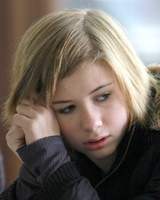October 24, 2006
Old school

Where to start with Sunday's enthralling - Elektric - Prime Suspect conclusion?
Perhaps with the ending, which, to my great relief, avoided all pyrotechnics; neither the characters nor the complications were sacrificed to the soap opera punctuation mark of the cheap death scene. (This was contrary to media misdirection, which hinted rather heavily that Tennison would not survive...)
If I was unsure about Prime Suspect when it started, that was because of misgivings about Lynda La Plante, whom I've always distrusted for many of the same reasons that I've never been persuaded by Jimmy McGovern. There is always a kind of femachismo in La Plante's writing, a sentimentalization of male homosociality, as if the greatest achievement for a woman would be to be included in a man's world. (It comes as no surprise to learn that La Plante was reportedly sniffy about the direction that the final Prime Suspect ....)
But by the end, Tennison no longer wants to be 'one of the lads'. So in the final scene, she refused the tawdry consolations of easy bonhomie, walking her own - lonely - path, burned out, battered, but unbowed - just herself and the choices that she still affirms: the consummate existentialist.
This was a loneliness denuded of all glamour; not a young man's loneliness, where you can walk off into a sunset, knowing there are many sunsets to come. Knowing also that domesticity and reproduction are not expected of you (and Prime Suspect has always been clear that women have still not escaped those expectations). The hard choices she had to make bite harder as she gets older, now that there are only cheerless entrance halls and not heated arguments with exasperated lovers to come home to, and the whole familiar, familial world points fingers of reproach.
The scenes at the funeral were especially powerful: Tennison heroically rejecting the embrace of the Family, smug sister and smug niece (plummy niece's accent mercilessly mocked by Tennison) proferring reproductive futurism's warm milk, Tennison preferring to drink alone (repulsing, too, the repulsive sexual overtures of an opportunistic barman: 'Take your fucking hand off me.')
Hearth and home were always a temptation, a deflection, and Tennison is resolute in seeing the agents of reproductive futurism as demonic avatars, offering a succour more fake, more deadly even than the bottle. Children would have been an indulgence for Tennison, who had chosen, instead, to clear up the mess produced by other people's children.... And by their parents, whose love, if it is there at all, is both excessive and insufficient (but what is love if it is not an excess, a sickness, and this Prime Suspect suggested that the sickest love of all is that between father and daughter?)
So there is Tennison, pushing her way through other people's children, a 'Zombie Army of teenagers ...'
When Prime Suspect started it could look as if it the structuring opposition was career versus domesticity (very La Plantean/ Thatcherite); but by the end, it was a matter of domesticity versus public duty. And who is going to thank you for choosing public duty, these days? (Thankfully, it turns out that there are some hard won words of thanks at the end, all the more moving for their quieteness, their difficulty, their lack of ceremony. This will have to be enough.)
So many shots of Tennison in a lit office, framed by darkness... The public world, receding, rotting ... The streets now a stalking and prowling ground for other people's children, abandoned by absentee parents, long gone or (always) late home...
One of the new Blairite therapeutic-managerialist cops describes Tennison as 'old school'... Yes, in so many ways...
Tennison's existential drama was so consummately drawn that the plot almost became a distraction. You could drown in the nuances in Mirren's expression, her face a crumpled mask over which she exerted painterly control. Now, she is a bewildered old woman hastily covered in a blanket, resurfacing from yet another black-out; now, the ruthless hunter, the steel in the eyes, the spine, the mind, glinting again...
But it wasn't all about Mirren.

Laura Greenwood deserves special credit for her performance as Penny: an incendiary combination of teen rage, wounds, secrets, intelligence, sensitivity. Teenagers, so poorly served by most TV drama, emerged as complex figures for once: the frontline casualties of neo-liberalism's economic experiments, victims and betrayers because betrayed by everyone, beguiling but dangerous in so many ways. One of the themes was adults' vulnerability to teenagers. Most of the adult characters are ruined, compromised, or weakened by their love for teenagers. (They fuck you up...) Not least Tennison herself.... 'She stole my heart...'
This was an exquisite production in every respect. Little details... As Ian put it last week: 'The most touching details ... are also always the smallest, the most prosaic; like the victim's father, needing to go off and just sit in his car, alone, with a can of beer. (If this is true, which we donít actually know yet. But it *felt* true.)' It did turn out to be true, a credit to the script. This is the kind of detail one often finds in Highsmith, where a character assumes guilt not because their actions are malevolent, but because they are inexplicable, apparently causeless. The strange contingency of desire...
Exceptional use was made of longueurs, the camera lingering on scenes long after the grammar of TV drama has taught us to expect it to depart - a technique that has perhaps been borrowed from comedies like The Office. Sound was crucial here: scratchy fumblings, airconditioner hum, evoking the intertia of the Real....
Into these silences and near-silences, violence, when it erupted, was that much more terrifying...
The perfect ending...
Doubles and doubling everywhere...
(Blackouts)
'You remind me of...'
'You...'
'When I was your age...'
Tennison's double, Penny - the ghost of what she was, become the revenant-revenger of her aborted child. (No-one could have failed to notice that Penny is about the age that Tennison's child would have been if it had not been terminated...)
'How could you kill your child?'
The last stand, between Tennison and reproductive futurism...
But Tennison holds her nerve, yields nothing to reproductive futurism, affirms - though the whole world, family photos on its desk, seems to disagree - that her ethical commitment to public duty was the right choice.
Posted by mark at October 24, 2006 12:40 PM | TrackBack